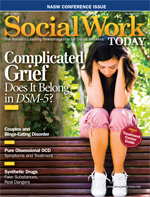|
Messages From 24/7 Care Persons My passion for many years has been talking with family members and professionals around the country, listening to their stories of being with a person with dementia and empowering each to create moments of connection with that person and cocreate a more supportive community of care. A powerful truth has emerged from these encounters: One person can’t do it all when it comes to caregiving. Compassionate care is required for both the person with dementia and the care person. Because we as social workers are appropriately conscious of words’ impact on attitudes and approaches, this article will shift away from the term “caregiver,” in which unidirectional care is given to the person with dementia, instead using the term “care person,” which supports an understanding that the caring relationship is interactional and mutually beneficial for all. At every location and with increasing frequency, social workers and family members ask for guidance specifically about how to help the most dramatically isolated and overwhelmed 24/7 care person who is often seen as resistant to receiving help. To explore this problem, I interviewed more than 250 once-overwhelmed care persons who have not only survived their inundating and powerfully distressing experiences but thrived. Below is a summary of what I gathered. ‘Let Me Work It Out in My Own Time!’ As essential and well intentioned as such advice can be, these suggestions can often hit hard for the overwhelmed and leave him or her feeling even more alone in an endless swirl of emotions. They feel others “just don’t see” that they “can’t possibly muster the energy to do any of these things. All efforts are going to the person with dementia and to trying to keep it together.” The common theme of the stories told to me by the once overwhelmed was clear: Their most difficult and isolating caregiving experiences began to transform when they started to discover themselves—where they were—in the mess and mix of caregiving and found a way to get something back. It required them to take action toward beginning to open to connections. Each found ways to connect with themselves and people and activities that nurtured them. From that came strengthening bonds with others—people in the family and community and, in some cases, a spiritual power. The overwhelmed care person may not have the energy or may not be ready to open up to connections. Isolation, for a time, is OK—unless the care person or someone else is in danger. Social workers can give them permission (and encourage others to do the same) to take an outwardly directed step in their own time. Direct them so that whenever they have whatever it takes for them to move in a direction beyond their pain and/or isolation, it is toward connection of some kind. To support and encourage them along this path, once-overwhelmed 24/7 care persons suggest two tools: • Post an up-to-date list of emergency contact numbers. Social workers can easily make available a card of important resources, which can be lifesaving for many care persons. On the social worker line, I fill in my name and contact information so it is at the client’s fingertips before an emergency occurs. Nothing is more difficult than finding contact information during a crisis. Encourage care persons to fill in all contacts and post the list wherever it is most convenient and obvious, such as by the telephone or on the refrigerator. Posting it can be a helpful reminder that there are people available to help care persons whenever they are ready. • Post supportive notes around the house. Moment-to-moment reminders, such as inspirational phrases, quotations, reminders for self-care, and affirmations, helped many 24/7 care persons survive as they moved through their days. As they learned to post reminders for the person with dementia, they began posting notes to themselves all over their home—on mirrors, cabinets, television sets, toilet seats, counter spaces, bed posts—anywhere they would be sure to see them. They found these reminders caught them off guard and helped shift a tense or frustrating moment. Postings are easy for social workers to print and hand out with their contact information on the back. They are simple things that can open the care person, if even in a seemingly small way, toward the beautiful discovery that they are not alone. ‘Please Know How Important the Little Things Are’ Social workers’ actions, particularly when consistent over time, let care persons know we are thinking of them and help them realize they are not alone. If they have turned down an offer of help or not promptly returned a phone call, our actions let them know we are not taking their distancing personally. After all, they are not rejecting us; they are just trying to keep it together. The last thing they need to do is take care of everyone else’s feelings. ‘Chunk It Down for Me!’ ‘It’s Really All About Touching My Heart’ — Nancy Pearce, MS, MSW, LISW, specializes in dementia care and is the author of Inside Alzheimer’s: How to Hear and Honor Connections With a Person Who Has Dementia. |

 July/August 2012 Issue
July/August 2012 Issue